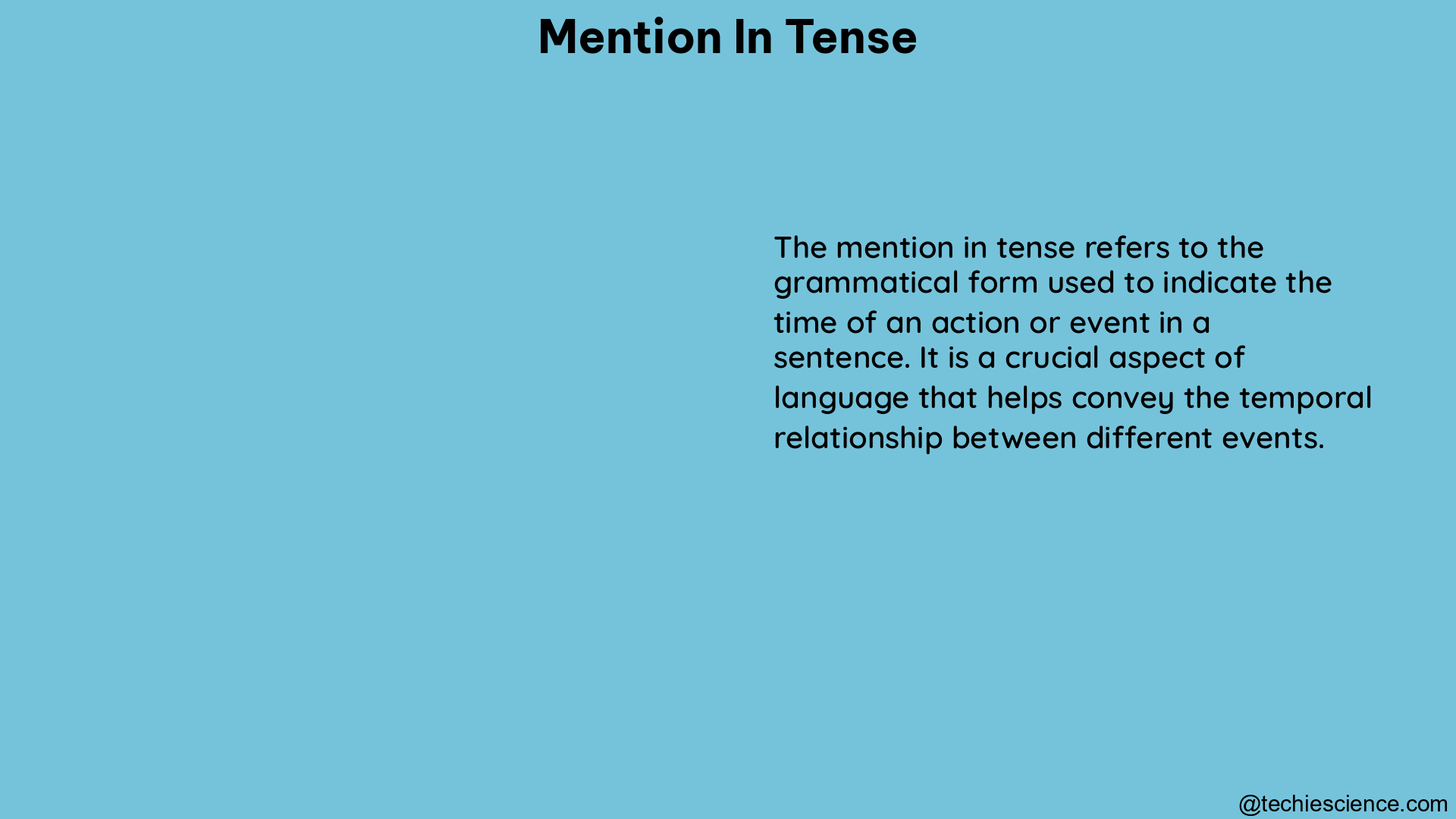The verb “mention” is a regular verb in English, and its conjugation follows a standard pattern. This comprehensive guide will delve into the intricate details of using “mention” in various tenses, providing you with a thorough understanding of this essential aspect of the English language.
Understanding the Present Tense of “Mention”
In the present tense, the conjugation of “mention” follows a straightforward pattern:
- I mention
- You mention
- He/She/It mentions
- We mention
- You mention
- They mention
The present tense is used to express actions or states that are happening in the current moment, or to describe general truths or habitual actions.
Example: “The news article mentions the latest developments in the ongoing political crisis.”
Exploring the Present Progressive Tense of “Mention”

The present progressive tense is used to describe an action that is currently in progress. The conjugation of “mention” in this tense is as follows:
- I am mentioning
- You are mentioning
- He/She/It is mentioning
- We are mentioning
- You are mentioning
- They are mentioning
This tense emphasizes the ongoing nature of the action, rather than a single, completed event.
Example: “As I’m reading the report, I am mentioning the key points to my colleagues.”
Delving into the Past Tense of “Mention”
The past tense of “mention” is used to describe actions that have already occurred. The conjugation is as follows:
- I mentioned
- You mentioned
- He/She/It mentioned
- We mentioned
- You mentioned
- They mentioned
This tense is often used to recount past events or to describe actions that were completed in the past.
Example: “Last week, the professor mentioned the importance of citing sources in our research papers.”
Examining the Past Progressive Tense of “Mention”
The past progressive tense is used to describe an action that was ongoing in the past. The conjugation of “mention” in this tense is as follows:
- I was mentioning
- You were mentioning
- He/She/It was mentioning
- We were mentioning
- You were mentioning
- They were mentioning
This tense emphasizes the continuous nature of the action, rather than a single, completed event.
Example: “While I was writing the report, I was mentioning the key findings to my team.”
Mastering the Present Perfect Tense of “Mention”
The present perfect tense is used to describe an action that has been completed in the past, but has relevance to the present. The conjugation of “mention” in this tense is as follows:
- I have mentioned
- You have mentioned
- He/She/It has mentioned
- We have mentioned
- You have mentioned
- They have mentioned
This tense is often used to describe experiences or actions that have an ongoing impact or relevance.
Example: “I have mentioned the importance of this project to the management team several times.”
Navigating the Present Perfect Progressive Tense of “Mention”
The present perfect progressive tense is used to describe an action that has been ongoing for some time and is still continuing. The conjugation of “mention” in this tense is as follows:
- I have been mentioning
- You have been mentioning
- He/She/It has been mentioning
- We have been mentioning
- You have been mentioning
- They have been mentioning
This tense emphasizes the duration and continuous nature of the action.
Example: “I have been mentioning the need for a new marketing strategy in our team meetings for the past few weeks.”
Exploring the Past Perfect Tense of “Mention”
The past perfect tense is used to describe an action that was completed before another past action or event. The conjugation of “mention” in this tense is as follows:
- I had mentioned
- You had mentioned
- He/She/It had mentioned
- We had mentioned
- You had mentioned
- They had mentioned
This tense is often used to establish the chronology of events in a narrative or to describe actions that occurred before a specific point in the past.
Example: “By the time the meeting started, I had mentioned my concerns about the project timeline to the team.”
Delving into the Past Perfect Progressive Tense of “Mention”
The past perfect progressive tense is used to describe an action that was ongoing in the past before another past action or event. The conjugation of “mention” in this tense is as follows:
- I had been mentioning
- You had been mentioning
- He/She/It had been mentioning
- We had been mentioning
- You had been mentioning
- They had been mentioning
This tense emphasizes the continuous nature of the action in the past, prior to another past event.
Example: “By the time the meeting started, I had been mentioning the need for a new marketing strategy for several weeks.”
Understanding the Future Tense of “Mention”
The future tense is used to describe actions or events that will occur in the future. The conjugation of “mention” in this tense is as follows:
- I will mention
- You will mention
- He/She/It will mention
- We will mention
- You will mention
- They will mention
This tense is often used to make predictions, plans, or express intentions about the future.
Example: “I will mention the new project proposal in the next team meeting.”
Exploring the Future Progressive Tense of “Mention”
The future progressive tense is used to describe an action that will be in progress at a specific point in the future. The conjugation of “mention” in this tense is as follows:
- I will be mentioning
- You will be mentioning
- He/She/It will be mentioning
- We will be mentioning
- You will be mentioning
- They will be mentioning
This tense emphasizes the ongoing nature of the action in the future.
Example: “By the time you arrive, I will be mentioning the key points of the presentation to the team.”
Mastering the Future Perfect Tense of “Mention”
The future perfect tense is used to describe an action that will be completed by a specific point in the future. The conjugation of “mention” in this tense is as follows:
- I will have mentioned
- You will have mentioned
- He/She/It will have mentioned
- We will have mentioned
- You will have mentioned
- They will have mentioned
This tense is often used to describe actions or events that will be completed before a certain time in the future.
Example: “By the end of the day, I will have mentioned the project updates to all the stakeholders.”
Navigating the Future Perfect Progressive Tense of “Mention”
The future perfect progressive tense is used to describe an action that will be ongoing up to a specific point in the future. The conjugation of “mention” in this tense is as follows:
- I will have been mentioning
- You will have been mentioning
- He/She/It will have been mentioning
- We will have been mentioning
- You will have been mentioning
- They will have been mentioning
This tense emphasizes the continuous nature of the action leading up to a future event.
Example: “By the time the meeting starts, I will have been mentioning the importance of this project to the team for several weeks.”
Imperative and Infinitive Forms of “Mention”
In addition to the various tenses, “mention” also has imperative and infinitive forms:
Imperative
- Mention
- Let’s mention
The imperative form is used to give a direct command or instruction.
Infinitive
- To mention
The infinitive form is used to express the verb without any specific subject or tense.
Participle Forms of “Mention”
“Mention” also has present and past participle forms:
Present Participle
- mentioning
The present participle is used to form progressive tenses and can also be used as an adjective.
Past Participle
- mentioned
The past participle is used to form perfect tenses and can also be used as an adjective.
Examples of “Mention” in Context
- Present Tense: “The news article mentions the latest developments in the ongoing political crisis.”
- Past Tense: “Last week, the professor mentioned the importance of citing sources in our research papers.”
- Present Perfect Tense: “I have mentioned the importance of this project to the management team several times.”
- Future Tense: “I will mention the new project proposal in the next team meeting.”
- Past Perfect Tense: “By the time the meeting started, I had mentioned my concerns about the project timeline to the team.”
Reference:
- https://ell.stackexchange.com/questions/11253/mentions-vs-mentioned-verb-tense-when-summarizing-news-article
- https://simple.wiktionary.org/wiki/mentioned
- https://www.theconjugator.com/english/verb/to%2Bmention.html

Hi…. I am Goutam Datta. I have completed a double M. A. in English and B. Ed. I am a creative writer. Currently, I am a part of the LambdaGeeks.